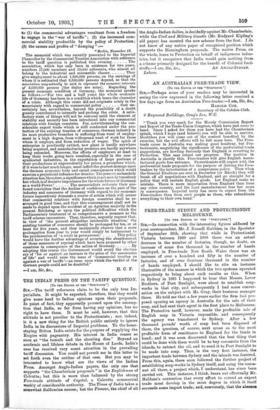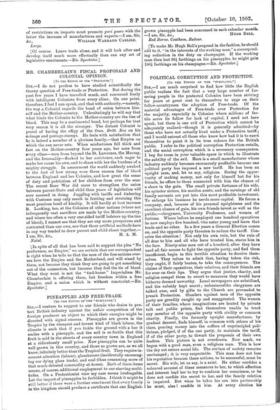FREE-TRADE SYDNEY AND PROTECTIONIST ME LBOURNE.
[TO THE EDITOR OF THE " SPEOTATOR.1
Sin,—In connection with the interesting figures adduced by your correspondent, Mr. J. Russell Gubbins, in the Spectator of September 26th, showing that while in Protectionist, Victoria between 1889 and 1900 there was an actual decrease in the number of factories, though, no doubt, an increase of some five thousand in the number of hands employed, in Free-trade New South Wales there was an increase of over a hundred and fifty in the number of factories, and of over fourteen thousand in the number of hands employed, I should like to cite an instance illustrative of the manner in which the two systems operated respectively to bring about such results as this. When in Sydney in 1895 I happened to bear that Messrs. Lever Brothers, of Port Sunlight, were about to establish soap- works in that city, and subsequently I had some conver- sation on the subject with Mr. Gray, their business manager there. He told me that a few years earlier the firm had pro- posed opening an agency in Australia for the sale of their soap, and had sent their agent in the first place to Melbourne. The Protective tariff, however, made the profitable sale of English soap in Victoria impossible, and consequently the agency was transferred to Sydney. After a few thousand pounds' worth of soap had been disposed of there, the question, of course, next arose as to the most profitable form of remittance to England for the funds in hand ; and it was soon discovered that the best thing that could be done with them would be to buy cocoanuts from the islands, to extract the oil, and to send it to Port Sunlight to be made into soap. Thus, in the very first instance, the important trade between Sydney and the islands was fostered. From this, again, there soon followed the further project of establishing soap-works in Sydney itself, and using the cocoa- nut oil there, a project which, I understand, has since been carried out. This instance, I think, bears out effectually Mr. Haldane's contention that every effort to extend an export trade must develop in the same degree in which it itself succeeds some import trade; and, conversely, that the absence
of restrictions on imports must promote pari passu with the latter the increase of manufactures and exports.—I am, Sir, [Of course. Leave trade alone, and it will look after and develop itself much more effectually than can any set of legislative enactments.—En. Spectator.]















































 Previous page
Previous page